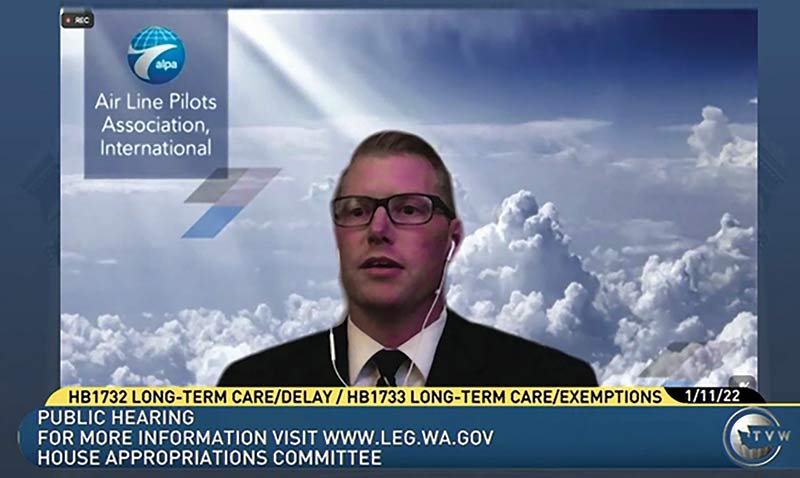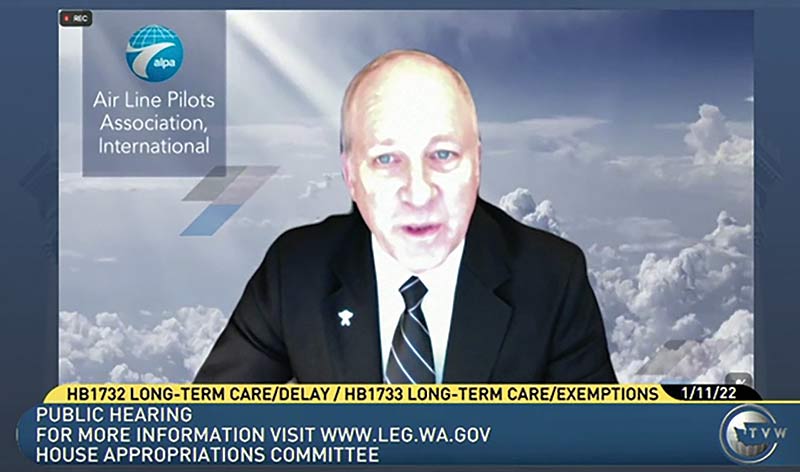ALPA Presses for Washington State Long-Term Care Exemptions
From the Hill
By John Perkinson, Senior Staff Writer
On Jan. 11, 2022, Capt. Doug Mattson (United) and Capt. Mike Schneider (Alaska) testified in support of House Bill 1733 during a virtual public hearing held by the Washington state House Appropriations Committee, which examined the prospects of granting exemptions from the Washington State Long-Term Care Trust Act. The act created a publicly funded long-term care insurance program in which all Washington-based workers are required to pay an uncapped payroll tax of .58 percent on all W-2 earnings through payroll deductions.
The two ALPA pilots urged policymakers to consider the unique circumstances confronting airline workers. “I work with hundreds of pilots who commute to their domicile, and I’m one of those pilots,” said Mattson, a lifelong Washington resident and someone approaching retirement.
Mattson spoke about the frequency of commuting to and from work and the normality of periodic moves for flightcrew members, observing that during his 30-year career he had changed pilot bases five times. “Although I live in Gig Harbor, I’m based in San Francisco, Calif., and the story is the same for thousands of pilots who fly out of SEA-TAC [Seattle-Tacoma International Airport] but live elsewhere,” he commented.


Capts. Mike Schneider (Alaska), top, and Doug Mattson (United) testify during a virtual public hearing held by the Washington state House Appropriations Committee on the Washington State Long-Term Care Trust Act.
“Several options to amend the program have been discussed by the legislature and commission.” Mattson continued. “We support a voluntary exemption for persons residing outside our state while working in Washington. Thousands of aviation workers will cycle through SEA-TAC over the course of their careers.”
“I support the proposed voluntary exemption for persons living outside of Washington while working in Washington,” remarked Schneider, who noted that he’ll be transferring from Alaska Airlines’ Seattle pilot base to its operation in Los Angeles, Calif., later this year and is concerned he’ll lose the money he’s compelled to pay into the program.
Speaking to Appropriations Committee members, Schneider also advocated for “making the current opt-out provision an annual option as it is with changing insurance plans, FSA withholding, and several other health and welfare programs.” The Long-Term Care Trust Act provided an initial window of opportunity for workers already insured with private long-term care coverage to be excluded from this new payroll tax, but their insurance coverage had to be in place by Nov. 1, 2021.
Alternatively, Schneider suggested simply exempting airline pilots from the tax, provided they could opt into the program if they wished to participate. Another option would be to make the tax refundable, but questions remain about how this could be properly managed.
Enacted in 2019, the Washington State Long-Term Care Trust Act was created to provide eligible Washington state residents with up to $100 per day, with a maximum lifetime limit of $36,500 (adjusted for inflation), to pay for long-term care services. These services could include at-home or nursing facility care, home-delivered meals, dementia support, and adaptive equipment, such as in-home railing and wheelchair ramps. The motivation for the law was based on the likelihood that seven in 10 Washingtonians over the age of 65 will need long-term services and support within their lifetimes.
Beginning Jan. 1, 2024, and every two years, the tax will be set at a rate (no greater than .58 percent) necessary to maintain funding levels, with benefits available starting Jan. 1, 2025. Those policymakers who drafted this unique measure hoped to establish a mechanism to help meet the health-care needs of state citizens while ensuring available resources would be sufficient to withstand an excessive number of claims at any given time.
House Bill 1733, if enacted, would allow those working in Washington but residing elsewhere as well as temporary workers with nonimmigrant visas, disabled veterans, and spouses of active-duty military members to opt out of the program. House Bill 1732 would delay implementation of the law for 18 months to allow for the extension of benefits to persons nearing retirement.
In response to the Washington State Long-Term Care Trust Act, last year ALPA launched a long-term care insurance marketplace, providing pilots with options to purchase pilot-paid, long-term care insurance, which qualifies for an exemption from the new payroll tax. Meanwhile, the Association has submitted amendment language to the bill and continues to press lawmakers to consider exemptions to remedy this inequitable situation.

